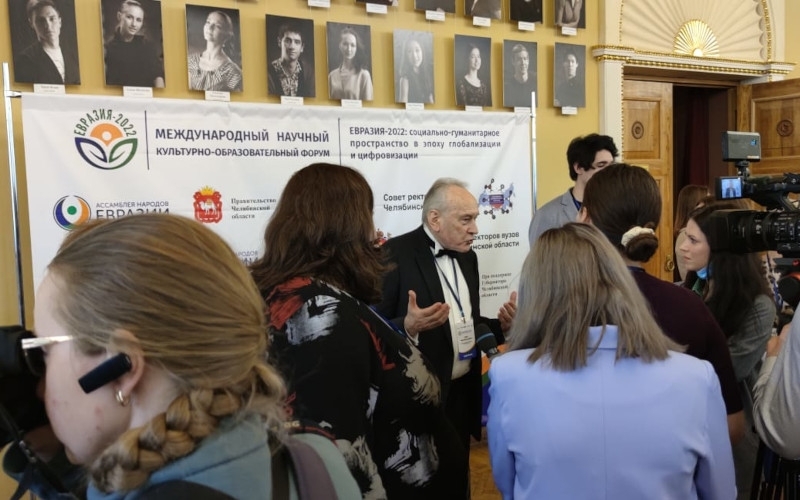
April 6 - 8, the International Scientific Cultural and Educational Forum "Eurasia - 2022: Social and Humanitarian Space in the Era of Globalization and Digitalization" was held in the Southern Urals (Russia). The opening of such a large-scale event took place at the Chelyabinsk State Academic Opera and Ballet Theater named after Mikhail Glinka.
The founders of the forum are the Government of the Chelyabinsk Region, the Ministry of Education and Science of the Chelyabinsk Region and the Ministry of Culture of the region.
The Governor of the Chelyabinsk Region Alexey Texler addressed the guests with a welcoming speech:
"The Eurasia-2022 Forum is a landmark event for our region. It is now more relevant than ever to talk about Eurasian cooperation: to establish contacts, create projects, and expand cooperation in science and culture. It is very important to continue active work within the Council of Heads of Regions of the Shanghai Cooperation Organization member countries."
The Governor drew attention to the fact that the international platform of the Eurasia-2022 forum unites just different facets of cooperation, makes it possible to develop a single socio-humanitarian and digital space of Eurasia, expand cooperation in education, culture, science, innovation and realize the special mission of Russia as a State uniting Europe and Asia.
The forum was co-organized by the Eurasian Peoples’ Assembly. The greeting of the Secretary General of the Eurasian Peoples’ Assembly Andrey Belyaninov was announced by the Deputy Secretary General of the Eurasian Peoples’ Assembly Valery Ruzin.
In particular, Andrey Belyaninov noted:
"I think it is right and timely to hold a large-scale social and humanitarian forum, in fact, in the center of the Eurasian continent, which is going through severe trials. Against the background of global shifts and destruction, it is strategically important today to highlight and raise issues of a creative nature – education, culture, science, ecology, youth policy. Sooner or later conflicts will end, cataclysms will subside, the world will move to a new model of existence. It is important that we already understand today what this new life should be and on what foundation it should be built. The Forum provides an opportunity to discuss this."
The Secretary General of the Eurasian Peoples’ Assembly thanked the organizers of the forum and personally the Governor of the Chelyabinsk region for creating such a "representative international platform, attracting higher school experts, representatives of public organizations to a joint dialogue, understanding the humanitarian foundations of the development of the Eurasian continent" and concluded his greeting with the words:
"I wish the participants of the Forum "Eurasia-2022: social and humanitarian space in the era of globalization and digitalization" productive work, good communication, scientific and creative discoveries!"
Among the organizers of the event is the Board of Directors of Universities of the Chelyabinsk region. The guests were welcomed by its chairman, Rector of the largest university in the Chelyabinsk Region, South Ural State University Alexander Shestakov:
"The Eurasia-2022 Forum has a powerful educational, cultural and educational mission. The leading universities of the region have united to jointly discuss the state of the cultural and multidisciplinary environment of Eurasia, to give impetus to new humanistic ideas of international cooperation."
More than 5,500 participants registered for the forum, about half of them came to Chelyabinsk on a personal visit. The rest participated in a remote format. The Forum was held at 14 thematic sites in nine major universities of the Chelyabinsk region – in Chelyabinsk, Magnitogorsk and Miass. Following the results of three days of work, the Declaration of the international forum was adopted. The landmark document was signed on the final day of the forum, April 8 at South Ural State University. The trilateral document was signed by the Government of the Chelyabinsk Region by the Minister of Education and Science Alexander Kuznetsov, on the part of the Eurasian Peoples’ Assembly by the Deputy Secretary General of the Eurasian Peoples’ Assembly, President of the Eurasian Academy of Television and RadioValery Ruzin and SUSU Rector Alexander Shestakov from the Council of Rectors of Universities of the Chelyabinsk region.
Having become a big international event, the forum aroused great interest among the scientific community and the public. The scale of the event is grandiose, the geography of the forum includes 22 countries representing near and far abroad: Azerbaijan, Belarus, Belgium, Brazil, India, China, Serbia, Tajikistan, Turkey, etc. The forum was also attended by representatives of 30 regions of the Russian Federation. Among them are representatives of the authorities of the federal, regional and municipal levels; researchers and teachers of Russian and foreign educational organizations; students, postgraduates and young scientists of Russian and foreign universities; representatives of professional associations, public organizations; employees of cultural institutions, art, national cultural centers, media industry; mass media.
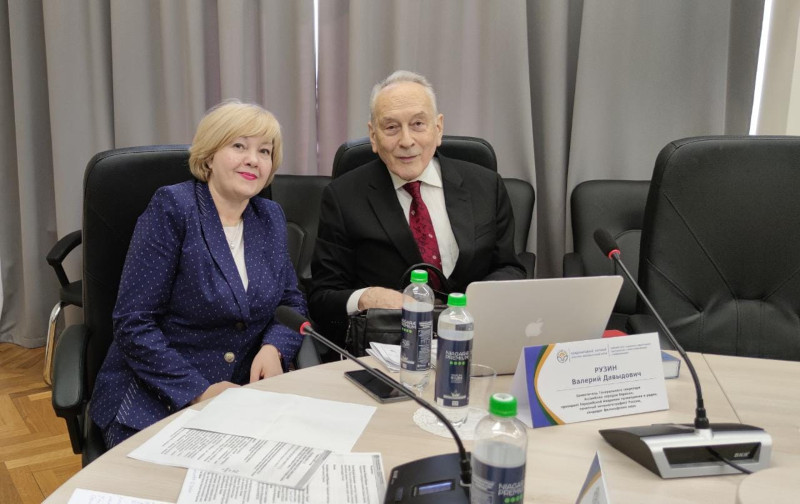
In the photo: Deputy Head of the General Secretariat of the Eurasian Peoples’ Assembly Marina Plyasunova and Deputy Secretary General of the Eurasian Peoples’ Assembly, President of the Eurasian Academy of Television and Radio Valery Ruzin
The Eurasian Peoples’ Assembly was represented on a large scale at the forum, it became the organizer of the panel sessions "Cultural interaction and communication in the socio-humanitarian space of Eurasia" and "Model of cultural diplomacy on the example of the Eurasian Peoples’ Assembly ". The moderators were Marina Plyasunova, Deputy Head of the General Secretariat of the Eurasian Peoples’ Assembly, and Valery Ruzin, Deputy Secretary General of the Eurasian Peoples’ Assembly, President of the Eurasian Academy of Television and Radio.
Opening the panel sessions of the Eurasian Peoples’ Assembly, Svetlana Smirnova, First Deputy Secretary General – Head of the General Secretariat of the Eurasian Peoples’ Assembly, addressed the participants and guests of the forum with a welcoming speech. She spoke about the mission entrusted to the Eurasian Peoples’ Assembly, about the most important activities of the organization, about its peacemaking role, linking the peoples of Eurasia into a single cultural and economic space.
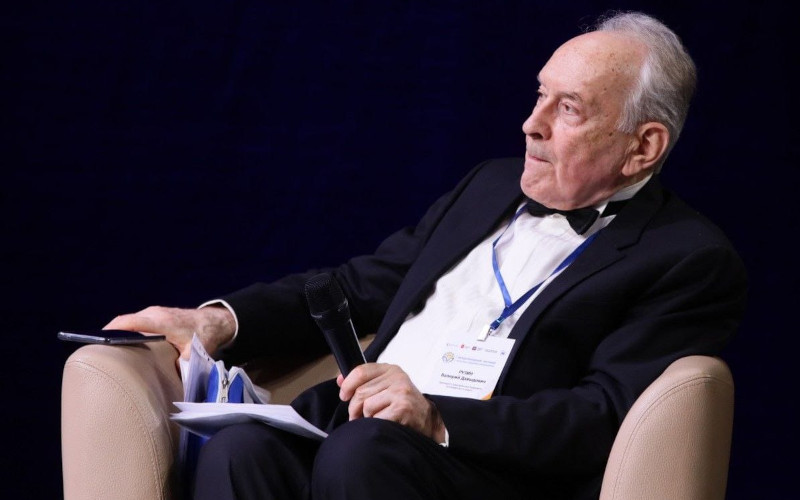
In the photo: Deputy Secretary General of the Eurasian Peoples’ Assembly, President of the Eurasian Academy of Television and Radio Valery Ruzin
The panel session "Cultural interaction and communication in the socio-humanitarian space of Eurasia" was held by Deputy Secretary General of the Eurasian Peoples’ Assembly, President of the Eurasian Academy of Television and Radio Valery Ruzin.
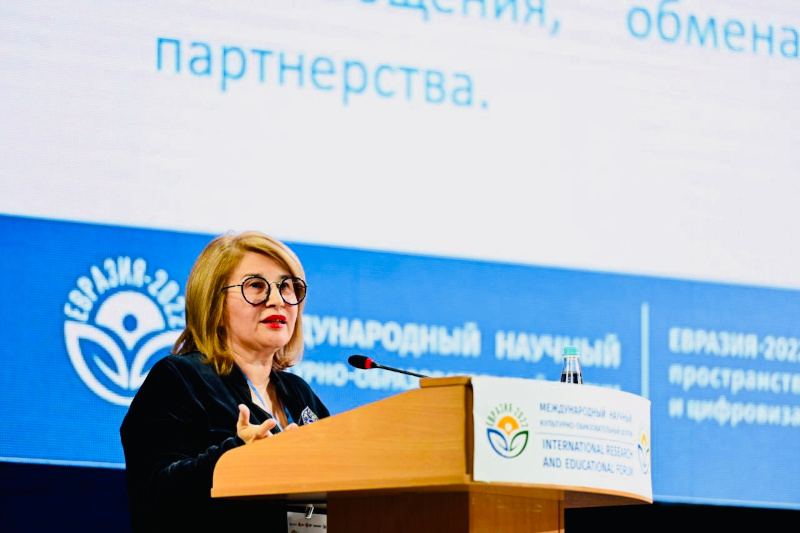
In the photo: member of the General Council of the Eurasian Peoples’ Assembly, President of the Foundation for Social Initiatives "Peace and Harmony", General Producer of the project "Theatrical Eurasia" Elmira Shcherbakova
Deputy Head of the General Secretariat of the Eurasian Peoples’ Assembly, President of the Foundation for Social Initiatives "Peace and Harmony", General Producer of the project "Theatrical Russia", Honored Artist of the Russian Federation Elmira Shcherbakova, twice spoke at the forum, she noted:
"I specially came to Chelyabinsk for the opera "Eugene Onegin", I was in Zlatoust. Today I will talk about the theaters of Eurasia, about the past, present and future. You know, you can already use the example of the Chelyabinsk region to reveal this topic! You have 17 theaters, three puppet theaters, and the Scarab Sand Painting Theater. And today it is so nice that our forum is being held in the temple of art. In my report, I will talk about the fact that we are all part of Greater Eurasia; we can saturate and enrich each other. I will talk about the Russian classical theater, which is loved all over the world and, of course, it will never die, it will develop."
It was Elmira Shcherbakova who stood at the origins of the project "Theatrical Russia", they came up with it together with her teacher Oleg Tabakov. The project allows the audience of Russian cities to get acquainted with the best theatrical performances of Moscow and St. Petersburg in a live broadcast and recording.
"Then everyone said it was impossible, but we did it, and during the pandemic the project was very relevant, we’ve introduced many people to the theater. Despite the importance of the project, I tell everyone: "go to the theater." The live theater cannot be compared with anything," - notes Elmira Shcherbakova.
Today, this project acquires new qualities and is called "Theatrical Eurasia". At the forum, Elmira Shcherbakova made presentations on "The Theater of Eurasia: yesterday, today, tomorrow" and "The role of international public organizations in the formation of new models of the Eurasian socio-humanitarian partnership".
Presentations were made by representatives of various activity areas.
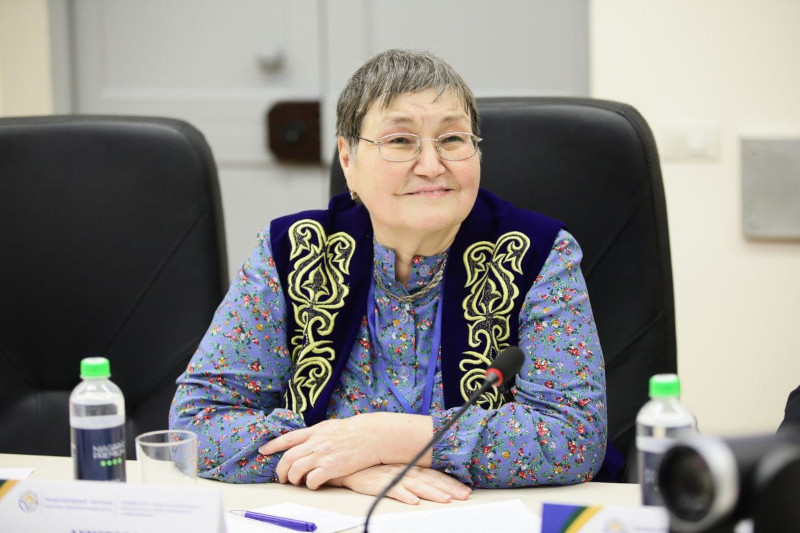
In the photo: member of the Eurasian Peoples’ Assembly, Head of the International Association of Descendants of Panfilov and their Friends, professor of Al-Farabi Kazakh National University Laila Akhmetov
At the first plenary session, the report of the member of the Eurasian Peoples’ Assembly, the head of the International Association of Descendants of Panfilov and their friends, professor of the Al-Farabi Kazakh National University Laila Akhmetova "Historical memory as the basis of unity and cultural interaction of the peoples of Eurasia" was presented.
Konstantin Mogilevsky, Chairman of the Board of the Russian Historical Society, Executive Director of the History of the Fatherland Foundation, Candidate of Historical Sciences, arrived with a report on the topic "Historical prerequisites for the unity of the peoples of the Eurasian space", and Elena Vartanova, Dean of the Faculty of Journalism at Lomonosov Moscow State University and President of the National Association of Mass Media Researchers, spoke about the new requirements that a journalist must meet in the context of the change of the "paradigm of freedom of speech".
The international platform of the Eurasia-2022 forum united various facets of cooperation, made it possible to develop a single socio-humanitarian and digital space of Eurasia, expand cooperation in education, culture, science, innovation and realize the special mission of Russia as a state uniting Europe and Asia. According to Valery Ruzin, Deputy Secretary General of the Eurasian Peoples’ Assembly, in the era of globalization it is especially important to preserve the identity of peoples. And the forum provides an opportunity to discuss how the world will live on.


